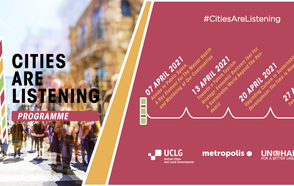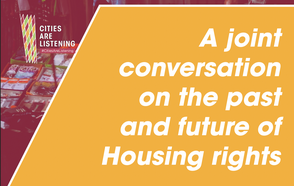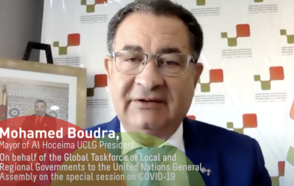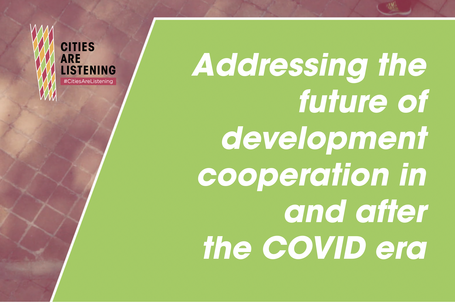
The mandate that arises from the #CitiesAreListening experiences is to transcend from social distance to a world driven by communities.
As a step to deliver the Pact for the Future that UCLG agreed to develop in its latest World Council in Guangzhou, the #CitiesAreListening Experience that took place on December 8th took the form of a high-level conversation on Development Cooperation and the COVID-19 pandemic involving representatives from all spheres of government as well as members from the donor community.
In partnership with the Capacity and Institution Building Working Group (CIB) of UCLG, which has worked on a joint position on COVID-19 and local government development cooperation, as well as DeLog, the conversation addressed the latest developments in international development and reflected on how the COVID-19 crisis has enlarged pre-existing issues but is also creating new opportunities for cooperation. The session brought together 120 participants from all around the world. 12 speakers representing local, regional governments and national governments, as well as international donor organizations, spoke about how COVID-19 is impacting their work, focus and priorities and reflected on how the development cooperation sector needs to evolve, in view of the changed context and needs of beneficiaries and partners.
The Session was introduced highlighting the challenges that development is facing at the moment. For the first time the Human Development Index will reflect a decline in human development. Over 100 million are affected. Up to 250 million people could suffer from extreme hunger and food stress. The shut downs have affected the millions of people dependent of the informal sector. 32 billion children are not able attend school and even when reopening, risk is high they will go into child labour. Also middle income countries depending on tourism will base the hardship strong economic and social crisis.
In this light, international solidarity and cooperation are more important than ever before. They stand central in the UCLG Decalogue for the post-COVID-19 era and underlined the important role of cooperation around local service provision, paths towards equality and governance, including the renewal of the multilateral system and in the recovery of the pandemic.
Jan van Zanen, Mayor of The Hague, Chair of VNG and UCLG co-president framed the conversation by stating how the UCLG membership believes in development cooperation as a key instrument for the recovery, and how critical it is to involve all stakeholders in the conversation to ensure a joint way forward within the sector. He further emphasized that the Sustainable Development Goals need to remain the central agenda in all of our efforts.
Throughout the pandemic, local and regional governments have proven time and again that solidarity is a beacon of security. The Pact for the Future that UCLG is developing, of which the #CitiesAreListening experience is an integral axis, aims at ensuring that the perspectives of our communities feed into the decision-making mechanisms and that access to basic services is guaranteed for all.
Decentralized cooperation is a key tool of international cooperation and development programmes, and essential to enhance the capacity of local and regional governments to develop collective knowledge and respond to challenges. Local and regional government associations have an essential role in promoting this among their membership and ensuring that our communities are at the core of the multilateral system by raising their voices and engaging in solid partnerships with all stakeholders.
The UCLG membership strongly believes that local government development cooperation is one of the key instruments to tackle the challenges ahead of society, from climate impacts, to social impacts and health issues. Moreover, development cooperation by local and regional governments can help achieve the Sustainable Development Goals, at home and abroad, also in the renewed context”. Jan Van Zanen, Mayor of The Hague, UCLG Copresident, Chair of VNG.
Emilia Saiz, UCLG Secretary General kicked off the session stating that “understanding cooperation as a universal principle (just as relevant for the global north as for the global south) is critical for the renewal of the social contract framed around the Sustainable Development Goals. The conversations on cooperation will also need to address the comeback and the rethinking of the global common goods and how they are delivered.”
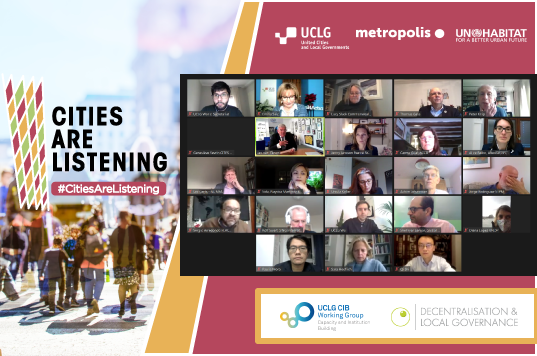
The first panel, consisting of 6 speakers from the local government sector and several Ministries of Foreign Affairs, was moderated by Lucy Slack, Deputy Secretary-General of the Commonwealth Local Government Forum, and asked participants to assess the role that local and regional governments are playing in the COVID-19 pandemic and how COVID-19 is impacting development cooperation.
Geneviève Sevrin, Director of Cités Unies France, argued that local and regional governments have adapted to the new context by transforming their international action into projects for immediate recovery, and highlighted the willingness of local and regional governments to learn from each other and to cooperate as a key aspect towards recovery.
Achim Johannsen, Senior Policy Officer at the Division Governance, Democracy, Rule of Law of the German Federal Ministry for Economic Cooperation and Development (BMZ) addressed the importance of tackling the growing inequalities, in particular when addressing the digital divide which is more pressing now than ever before. He further called to ensure local and regional governments’ access to finance as a means to reduce the pressure that they face.
Thomas Gass, Assistant Director General Swiss Development Cooperation, FDFA – Head of South Cooperation SDC - Ambassador – Co-Chair GPEDC, argued that the trends that were already in place before the pandemic were exacerbated over the past months, and that it is important to respond with a cohesive narrative on how the strengthening of the social fabric is channeled through the capacities of local and regional governments.
Shehryar Sarwar, Senior Analyst, Governance and Accountability, Global Affairs Canada, provided his insights on the impact of the pandemic on women and girls, and how the pandemic has further raised awareness on the need to build an enabling environment that would enhance women’s voices and leadership, and the importance of strengthening the local level to raise women’s voices in public life.
Bert Janssens, Head of European and International Unit at Association of Flemish Cities and Municipalities (VVSG, Flanders), argued that while COVID-19 put the world on hold during the first months, it has not put the working on and achievement of the SDGs on hold. He also addressed the challenges of city-to-city cooperation in a virtual context and argued that there needs to be a strengthened budget for development cooperation.
Nayoka Martinez Bäckström, Senior Program Specialist and Thematic Coordinator-Urban Development, Unit for Global Cooperation on Environment, Swedish International Development Cooperation Agency (Sida), highlighted that investing in the SDGs is also an investment towards recovery, and argued that Sida’s partnership with UCLG is essential for the achievement of the development agendas, since the world organization is a key influential political actor on behalf of local and regional governments and their communities. She highlighted the learning system that UCLG has developed for localization and the peer to peer exchanges as critical pieces for the agenda
The second panel, moderated by Cities Alliance Director Billy Cobbett, addressed the impact of the crisis on the priorities of development cooperation policies, and asked participants to provide their inputs on future scenarios for development cooperation. He further explained how the work of Cities Alliance had been affected, and called for the urban poor to be seen as equal partners in city development as a means to curb inequalities, which is in itself a pre-requisite for solving many crises of our time.
Shipra Narang Suri, Chief, Urban Practices Branch, UN-Habitat, opened the panel highlighting that the fiscal stimuli have not yet been addressed at local and regional governments, and that the conversations on the recovery and the transformation of the multilateral system need to address new sources of funding for subnational spheres of government.
Carme Gual, Director of the Catalan Agency for Development Cooperation, addressed the need for creating new alliances among with NGOs, academic institutions and humanitarian organizations, among others. She also called for identifying possible thematic alliances, such as that between the environmental sector and development cooperation, and mentioned that governments at all levels should facilitate spaces to ensure that these alliances happen.
Lex Gerts, Deputy Director of Stabilization and Humanitarian Aid, Ministry of Foreign Affairs the Netherlands, argued that, while the recovery agenda is large, the key aspect is to work with local actors to enhance resilience, ownership, and assessment of the universal development agendas. “Programming and policies need to be adaptive, but not erratic. We need to remain trustworthy partners”.
Jenny Jansson Pierce, Director SKL International, highlighted how the pandemic has shed new light on the importance of cooperation and on the importance of local governments’ associations. The pandemic, she argued, will need the development cooperation sector to develop strong partnerships and flexible projects, to ensure that we still achieve results.
Marlène Simeon, Director of PLATFORMA, showcased the #TeamEurope response to the pandemic, set in motion by the European Union, and argued that the goal is now to make sure that local and regional governments are truly included in the response, in particular in aspects such as human rights, gender equality, and the rights of migrants.
Hiroyuki Ito, Manager Green City Action Plan (GCAP) at the European Bank for Reconstruction and Development, laid out specific green city initiatives undertaken during the pandemic, and called for a holistic approach to resilience beyond disaster preparedness, that included access to services, education, and sustainable access to food.
Peter Knip, Director of VNG International and Chair of the CIB Working Group wrapped up the session by commending the Pact for the Future and the multi-stakeholder character of the #CitiesAreListening Experiences, and argued that, as a result of the ongoing crisis, the public domain is back in the conversation. It is essential to further carry out needs assessments in the countries that we work in, as well as in our own countries, to understand this new context and improve the lives of our communities.
“Listening to these conversations, I felt we share many common values between local and regional governments and their associations (implementers of development cooperation programmes) and donors. The needs of our partners have changed, the instruments of cooperation have changed. We need to see this as a joint responsibility to adapt to new realities in order to contribute to building back better”. Peter Knip, Director of VNG International and Chair of the CIB Working Group
UCLG Treasurer and Mayor of Kitchener Berry Vrbanovic provided the closing remarks, arguing that partnerships among local and regional governments are more necessary than ever, and that it is necessary to ask all spheres of government to join efforts for a more sustainable future.
“It has never been more important to be aligned and cooperative in order to deliver effective programmes. This pandemic has shown us that it is crucial to collaborate not just among local governments, but between spheres of government, to come together, engage in dialogues and in meaningful development work.” Berry Vrbanovic, Mayor of Kitchener, UCLG Treasurer.
The session ended with the commitment of all stakeholders to continue engaging in the structural dialogue provided by the CitiesAreListening Experiences and with the understanding that even if the priorities around development are not going to change. The why we do cooperation and how we prioritize the key issues are going to be impacted by the pandemic. It is undeniable that the protection of the commons both at local and global level will need to be a clearer objective than it has been until now.











